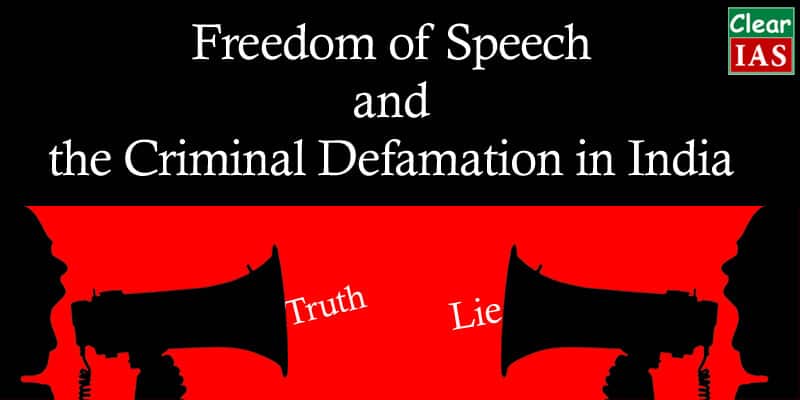
Criminal defamation is in news recently for multiple reasons. Questions have been raised on whether defamation should be treated as a civil wrong or criminal offence or both. It is argued that criminalizing defamation has a harsh effect on the right to freedom of speech and expression provided under article 19. There are many demands to make defamation only as a civil wrong.
However, the Supreme Court’s recent judgment upholding Sections 499 and 500 of the IPC as constitutionally valid has received wide attention, including visible, vibrant, sometimes even vicious criticism. In this article, we analyse the ‘Criminal Defamation’ in India. We will also discuss the way forward.
What is defamation?
- According to section 499 of IPC, whoever, by words either spoken or intended to be read, or by signs or by visible representations, makes or publishes any imputation concerning any person intending to harm, or knowing or having reason to believe that such imputation will harm, the reputation of such person, is said, except in the cases hereinafter expected, to defame that person.
- Section 499 also cites exceptions. These include “imputation of truth” which is required for the “public good” and thus has to be published, on the public conduct of government officials, the conduct of any person touching any public question and merits of the public performance.
- Section 500, which is on punishment for defamation, reads: “Whoever defames another shall be punished with simple imprisonment for a term which may extend to two years, or with fine, or with both.”
- In India, defamation is both civil and criminal offence. The remedy for civil defamation is covered under the Law of Torts. In a civil defamation case, a person who is defamed can move either High Court or subordinate courts and seek damages in the form of monetary compensation from the accused. Also, under sections 499 and 500 of the IPC, a person guilty of criminal defamation can be sent to jail for two years.
What is the difference between a civil wrong and criminal offence?

- Criminal offences and civil offences are generally different in terms of their punishment. Criminal cases will have jail time as a potential punishment, whereas civil cases generally only result in monetary damages or orders to do or not do something. But a criminal case may involve both jail time and monetary punishments in the form of fines.
- The standard of proof is also different in a criminal case than a civil case. Crimes must generally be proved “beyond a reasonable doubt”, whereas civil cases are proved by lower standards of proof such as “the preponderance of the evidence” (which essentially means that it was more likely than not that something occurred in a certain way).
Why are Section 499 and 500 of IPC challenged?
- Section 499 of the Indian Penal Code, 1860 (IPC) states that any person whose reputation has been damaged (or was intended to be damaged) by the material in question has the rights to sue for defamation.
- However, these are challenged on the ground of fact that they are violative of the right to freedom of speech and expression provided under Article 19 of the Indian Constitution.
Arguments for why IPC 499/500 should be declared unconstitutional
- Sections 499-500 IPC do not constitute a “reasonable restriction” on speech, as commented by many because, to begin with, even truth is not a defence. Even if a person has spoken the truth, he can be prosecuted for defamation. Under the first exception to section 499, the truth will only be a defence if the statement was made for the public good, which is a question of fact to be assessed by the court. This is an arbitrary and overbroad rule that deters people from making statements regarding politicians or political events even which they know to be true because they run the risk of a court not finding the statement to be for the public good.
- Second, a person can be prosecuted under section 499 even if he or she has not made any verbal or written statement at all. A magistrate may issue criminal process on the mere allegation that the defendant conspired with the person who actually made the allegedly defamatory written statements.
- Third, a person can be prosecuted even for a statement about the dead. While Article 19(2) permits restricting speech in the interests of protecting the private interest in a reputation, restricting speech to protect the reputation of the deceased is excessive and over-broad.
- Fourth, even an ironical statement can amount to defamation. Also, since section 499 applies to “any imputation concerning any person,” a criminal suit can be filed even for political speech – which is the most protected speech in a democracy.
- It is a tool that can be easily invoked and that enables allegedly defamed persons to drag anyone to courts across the country.
- Finally, it is unclear why defamation has to be a criminal offence at all and why civil remedies are not sufficient.
Arguments for why IPC 499/500 is not unconstitutional
- The reputation of one cannot be allowed to be crucified at the altar of the other’s right of free speech. So there is no point in declaring that the present law is unconstitutional. There is a need to strike balance between article 19 and article 21.
- Unlike other inflexible provisions of the IPC, Sections 499/500 have four explanations and 10 exceptions which do both: they add content and context to the offence as also chisel away at it substantially. They constitute significant counterfactual to exclude frivolous complaints.
- Section 199(1) the CrPC safeguards the freedom of speech by placing the burden on the complainant to pursue the criminal complaint without involving state machinery. This itself filters out many frivolous complainants who are not willing to bear the significant burdens – logistical, physical and monetary – of pursuing the complaint.
- A mere misuse or abuse of law, actual or potential, can never be a reason to render a provision unconstitutional.
Why should it remain a criminal offence and not made a civil offence?

- In India, citizens are unlikely to have enough liquidity to pay damages for civil defamation.
- It is argued that online defamation in the Internet age can be effectively countered only by making it a criminal offence, and the law is part of the state’s “compelling interest” to protect the dignity and reputation of citizens.
What is the view of the Supreme Court on defamation?
- The Supreme Court has ruled that the criminal provisions of defamation are constitutionally valid and are not in conflict with the right to free speech.
- The court stated that notwithstanding the expansive and sweeping ambit of freedom of speech, like all rights, the right to freedom of speech and expression is “absolutely sacrosanct” but “is not absolute.” It is subject to the imposition of reasonable restrictions. It also said that the reputation of a person is an integral part of the right to life granted under Article 21 of the Indian Constitution and it cannot be allowed to be crucified at the altar of the other’s right of free speech.
What can be the way ahead?
Criminal defamation should not be allowed to be an instrument in the hands of the state, especially when the Code of Criminal Procedure gives public servants an unfair advantage by allowing the state’s prosecutors to stand in for them when they claim to have been defamed by the media or political opponents.
In recognition of the fact that many countries do have criminal defamation laws which are unlikely to be repealed in the very near future, following interim measures can be taken:
- No-one should be convicted for criminal defamation unless the party claiming to be defamed proves, beyond a reasonable doubt, the presence of all the elements of the offence, as set out below;
- The offence of criminal defamation shall not be made out unless it has been proven that the impugned statements are false, that they were made with actual knowledge of falsity, or recklessness as to whether or not they were false, and that they were made with a specific intent to cause harm to the party claiming to be defamed;
- Public authorities, including police and public prosecutors, should take no part in the initiation or prosecution of criminal defamation cases, regardless of the status of the party claiming to have been defamed, even if he or she is a senior public official;
- Prison sentences, suspended prison sentences, suspension of the right to express oneself through any particular form of media, or to practise journalism or any other profession, excessive fines and other harsh criminal penalties should never be available as a sanction for breach of defamation laws, no matter how egregious or blatant the defamatory statement. (Reference: Article19.org)
(Qn for UPSC Mains) Criminal defamation is considered as a restriction on the right to freedom of speech and expression. Critically examine if this should be made a civil offence? What are the implications of this debate?
(Note: You may also read on the other contrasting case connecting freedom of speech. ie Sedition in India: Section 124A of IPC vs Freedom of Speech)
Also Read: Hate Speech
Article by: Pooja Chaudhary






Informative one 🙂 Thnks
I think this part of the article has a mistake with regard to (shall not) . It deviates from the point.
The offence of criminal defamation (shall not ) be made out unless it has been proven that the impugned statements are false, that they were made with actual knowledge of falsity, or recklessness as to whether or not they were false, and that they were made with a specific intent to cause harm to the party claiming to be defamed;
one should be given his rights to publish his words against any criminal law file against him and to prove him right .
as many politician manage to cover close the case file against them or for whom they are close to .
I have seen many people who has not done any criminal activities has been send to jail instead of those who have done due to politicians help…
criminal defamation should be maintained.
similarly, I have seen many cases abusing social media to tarnish women and employees by posting wrong or morphed info.
thanks for the information
Very informative. Thank you
do u agree that in democratic country like India should rt to privacy make fundamental rt
Tq for the information
Gives good idea about issue of defamation…thnxs
Can we file defamation case after winning 498A in 30/6/2017 or we are late
Nive
A member files defamation and the process issued by the magistrate court and the persons dies and he is the only compliant,can his heirs continue with case or the case is dismised,pl inform.Thanks
Mere uppr ek jhoota case lagaya gya tha agartala tripura me or ab mujhe adalat ne baizzat Bari krdiya to m manhani ka case kha dalu Delhi me ya agartala m wase Delhi me rhta hu plz bhaiyio btana jaroor
Lawyer collective published
false derogatory article on Spuwac. Com.all idiots official hushed up.court issued summons as accused
Want to ask.
We find lot of people using and abusing government via joke and make comments against PM and is functioning and doing.
I want to know, how this is treated under the law. We find some community people making lots of critical, jokes, sarcastic statement which can insult the PM and Government.
Please throw light on this.
This will help to update our knowledge
मेरे पर विपक्षी द्वारा मुझे एक अपराधी प्रकित का लिखते हुए वाद मेरे व पत्नी पर दुकान का स्टे लेने
हेतु डाला गया है मैं एक सरकारी कर्मचारी हूं दुकान पत्नी की है वाद लम्बित है क्या मैं मानहानि का वाद विपक्षी पर डाल सकता हूं कृपया उत्तर दे
Due to some civil dispute a person trying to defame by lodging a false written complaint in the local Police station and there after file a criminal case u/s. 144(2) of Cr. P.C. against me and others and against notice from the Magistrate I appear before the aforesaid Magistrate of Metropolitan Magistrate Court, I personally submit my submission before the said magistrate and police report which was submitted say nothing illegal act done by me, hence the magistrate dismiss the said case with remarks ” It is clearly appearing that this particular proceeding is nothing but an abuse of process of law and requited to be rejected…..Considering the aforesaid situation…. I deemed to prudent to be reject the prayer of the instant petition and thereby, the case is dismissed and dropped”. There after the said person again filled another criminal case against me with same false allegation against me u.s 107 of Cr. P.C. on the same court and same bench. The same Magistrate after gone through the police report and heard my personal submission he dismissed the said case also with a remarks ” police report says something otherwise wherein it has been mentioned that the real dispute inherent is civil in nature……Considering such position, this Court feels that there is not sufficient ground for proceeding against the Ops under section 107 of the Criminal Procedure and accordingly the present proceeding is dropped as dismissed”
My age is 70 years and I am a comorbidity patient suffering in various high risk deceases. The complainant always trying to drug me to local court against various false allegations for harassment purpose as well as his intention is that I may infected with COVIT 19 or any other deceases due to coming out from my resident in this corona situation.
Now I want to know whether I may lodge a complain in the local police station against him for regular harassment with false allegation as well as his intention to get me infected with COVIT 19 and fall ill.
Should I lodge a criminal as well as civil case of defamation u/s. 500 against the aforesaid person? Or I must lodge complain under any other section along with section 500?
Please guide me as early as possible.
Who can file defamation case ? A member of a party for his/her leader is eleigible to file the case.